Bottle Packaging Machine
Introducing the Qualipak’s Bottle Packing Machine- changing how bottling goes on. Our advanced technology guarantees exactness in filling, capping and labelling different bottle sizes and shapes. Simplify your production process, improve quality control with customized features and run it smoothly. For packaging solutions, invest in reliability and performance like those offered by Qualipak.
-
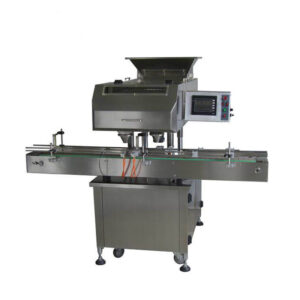
GS-16 Counting And Filling Machine
View Machines -
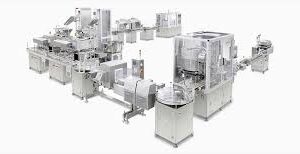
Automatic Tablet And Capsule Packing Line
View Machines -
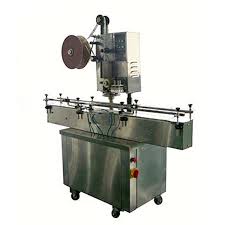
DI-200 Desiccant Filling Machine
View Machines -
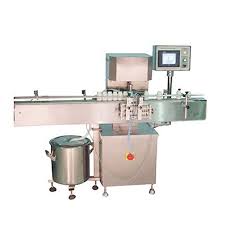
CI-200 Cotton Inserting Machine
View Machines -
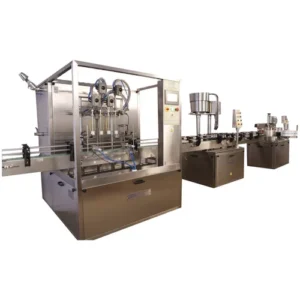
SLP Bottle Arranging Machine
View Machines -
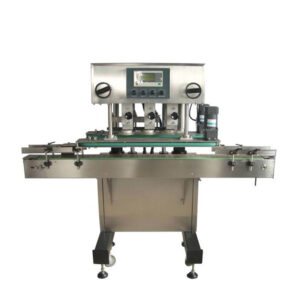
GX200 High Speed Capping Machine
View Machines -
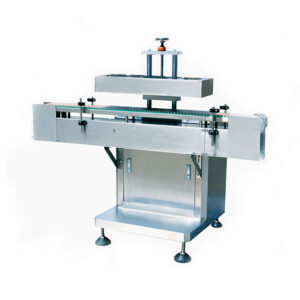
JF-2 Aluminum Foil Induction Sealing Machine
View Machines
Introduction of Bottle Packaging Machine
Packaging of goods in the world of industrial automation is a vital process that guarantees products are safely contained, preserved and transported to consumers. Bottle packaging machines are one of the various packaging methods that play an important role in the effective packaging of liquid and semi-fluid products. From water, and soft drinks to pharmaceuticals and household chemicals, bottle packaging machines have become critical components in modern factories. In this all-inclusive guide, we explore bottle packagers’ types, working processes, applications and functions, future trends, roles and advantages.
Understanding The Bottle Packaging Machine
- Types of Bottle Packaging Machines
- There are different types of bottle packaging machines each designed for specific needs depending on product type, production volume or packing format; here are some common ones:
- Automatic Bottle Filling Machines: These machines can fill bottles with liquid products such as water, juices and soft drinks automatically at high speeds. They use sensors in conjunction with programmable logic controllers (PLCs) to ensure accuracy while filling them up.
- Capping Machines: The capping machine is used for securely sealing bottles with caps or closures which can be of different kinds including screw caps, snap caps and press-on caps that provide a tight seal against leakage or contamination.
- Labelling Machines: Labeling machines facilitate accurate labelling on bottles efficiently; they can handle various labels like pressure-sensitive labels; shrink sleeves or wrap-around labels which enhances product visibility and identification.
- Bottle Washing Machines: This kind of machinery is utilized for cleaning bottles before filling to eliminate any contaminants or residuals that may affect the quality of the product; they clean using water jets plus brushes among other sterilization procedures.
- Shrink Wrapping Machines: Shrink wrapping machine wraps a protective plastic film tightly around a bottle when it heats up thus providing tamper-evident packaging as well as enhancing product shelf appeal.
- Bottle Inspection Machines: Inspection machines employ advanced imaging systems to check for defects such as cracks or leaks on bottles along with foreign substances thus ensuring quality control and compliance with regulatory standards before packaging.
- Working Processes of Bottle Packaging Machines
- The working processes of bottle packaging machines differ based on their type and function; however, they typically involve the following steps:
- Bottle Feeding: Empty bottles are manually or automatically fed into the packaging machine through conveyors or feed systems.
- Product Filling: The precise filling mechanisms are used in dispensing liquid or semi-liquid products into bottles. These processes may include volumetric filling, gravimetric filling or piston filling depending on product viscosity and consistency.
- Capping or Sealing: Caps or closures that are used in sealing filled bottles are applied by capping heads or sealing mechanisms whereby the caps are tightened securely for proper sealing to avoid any leaks.
- Labelling: Using labelling heads or applicators, labels are placed on the bottles. Information such as product information, branding elements, and barcodes among others is usually contained in these labels.
- Secondary Packaging: Where necessary, packaged bottles undergo secondary packaging such as shrink wrapping, cartooning and palletizing to facilitate transportation and storage purposes.
- Quality Inspection: Automated inspection systems monitor bottles for defects throughout the packaging process so that only high-quality products are released for distribution.
- Applications of Bottle Packaging Machines
- Versatility; efficiency and precision make bottle-packing machines widely applicable across diverse industries. Some common applications include:
- Beverage Industry: Bottle-filling machinery is commonly used in the manufacture of bottled water, carbonated soft drinks, fruit juices, spirits and sports drinks, thus enabling fast filling and sealing of bottles to meet consumer demand.
- Pharmaceutical Industry: Bottle packaging machines are used by pharmaceutical firms for packaging liquid medicines, syrups and oral suspensions into bottles with accurate dosing. They facilitate correct filling and sealing to maintain product purity.
- Cosmetics and Personal Care: Packaging of beauty and personal care products such as shampoos, rinse-off conditioners, lotions and shower gels into various shapes and sizes of bottles makes use of bottle packaging machines. They enhance their visual appeal on the shelves.
- Household Chemicals: Producers of household detergents/detergent chemicals/disinfectants rely on bottle packaging machines to package their products securely and efficiently. These machines simplify chemical handling processes while ensuring tight seals that prevent seepage or spillage.
- Food and Condiments: In the food industry, bottle packaging machines are employed to package sauces (salad dressings), condiments (mustard), oils (olive oil) as well as salad dressings in bottles or jars. The systems allow accurate bottling as well as ensure proper capping for preservation/longevity purposes.
- Automotive and Industrial Fluids: A bottle packaging machine is used in packing automotive fluids such as lubricating oil coolants and hydraulic fluids. These machines guarantee precision-filling operations necessary for meeting strict quality requirements presented by these industries
- Functions of Bottle Packaging Machines
- Bottle packaging machines have a range of tasks through which they enable an efficient distribution process without compromising the packaged goods’ quality. Some prime capabilities include:
- Filling refers to a process where an exact amount or weight of either liquid or semi-solid substances is placed into containers at fixed pre-set volumes according to product specifications so as not to spill off during transportation.
- Capping involves fitting and securing caps or closures on boots to prevent spillage, contamination and tampering throughout storage and transportation processes.
- The labelling process is product information, barcodes and other data that are stuck on the bottle for easy identification by the buyers, brand name as well as regulatory compliances for traceability of the item.
- Cleaning entails washing containers with water thoroughly before filling them to remove foreign particles or substances that may compromise the quality/safety of products.
- Inspection means the automatic detection of cracks, leaks or any other flaws in bottles to ensure conformity to quality standards set by law that govern a particular line of business.
- Packaging refers to covering the bottles with materials like shrink film or cartons that protect them from being broken during transportation while maintaining their purity and safety.
- Future Trends in Bottle Packaging Machines
- The future of bottle packaging machines is shaped by several trends as technology continues to evolve:
- Industry 4.0 Integration: The integration of IoT (Internet of Things), and AI (Artificial Intelligence) cloud computing with bottle packaging machines enables real-time monitoring, predictive maintenance and data-driven decision-making
- Flexible Packaging Solutions: Manufacturers are developing bottle packaging machines capable of handling a wide range of bottle sizes, shapes, and materials in response to changing consumer preferences and market trends
- Sustainable Packaging Practices: Eco-friendly bottle packaging machines that minimize material wastage energy consumption environmental impact are being developed due to an increased emphasis on sustainability in packaging
- Smart Packaging Features: RFID (Radio Frequency Identification) tags NFC (Near Field Communication) sensors. These sensors help communicate the presence of products on shelves; thus consumers can authenticate purchases directly from their smartphones.
- Enhanced Automation and Robotics: In bottling operations automation robotics are highly increasing throughput improved manufacturing precision safety
- Maintenance Assisted by Augmented Reality (AR): The manufacturers are looking into the employment of AR technology to give maintenance and troubleshooting support remotely, reducing downtime and improving machine reliability.
- Roles and Benefits of Bottle Packaging Machines
- Roles
- Efficient Productivity: Bottled packaging machines simplify the packaging process thereby tremendously increasing productivity as compared to manual ways. Within a fraction of the time, they can handle high quantities of bottles thus enhancing general efficiency.
- Precision and Accuracy: They are designed in a manner that allows them to fill bottles with specific volumes of liquid or semi-liquid stuff hence ensuring each parcel is fitted with a uniform quantity. In such industries that rely on dosage or product concentration as key determinants, precision becomes critical.
- Versatility: Various types of bottle sizes, shapes, and materials can be used on this type of machine allowing different makers to pack wide varieties of products. Being easily adjustable or reconfigured for changing production requirements is also another feature that makes them highly versatile.
- Quality Assurance: On bottle packaging machines there are automated inspection systems that check every bottle before it is packaged. This brings down the chances of sending faulty goods to consumers which ultimately boosts brand reputation while ensuring customer satisfaction.
- Cost-Effectiveness: Though the cost may be high during purchase, bottle packaging machines save costs in future through; improved efficiency hence reduction in labour expenses and less wastage during manufacturing leading to low cost per unit produced.
- Regulatory Compliance: For example, pharmaceuticals and food & beverages have very strict regulations governing their packaging processes. Filling accuracies combined with proper sealing ensures regulatory compliance by these systems with built-in traceability features.
- Safety: By automating repetitive tasks that would otherwise require humans’ involvement exclusively, bottle packaging machines improve job safety through the prevention of injury risks associated with hands-on packing processes.
- Advantages
- Increased Production Output: With high-speed operation rates bottled package machines allow companies to fulfill large demands without compromising quality levels and uniformity for merchandise.
- Improved Product Shelf Life: If bottle seals are properly done it will protect products from contamination, oxidation and other environmental factors thereby extending their shelf life and keeping them fresh.
- Enhanced Brand Image: Brand perception is improved by labels that are consistently designed and attractive with safe seals. The bottle packaging machines ensure that they maintain a similar look in all lines of products hence looking professional.
- Reduced Material Waste: By providing the correct amount of product into each bottle, automated filling and sealing processes reduce product waste. This minimizes excess usage of the product or materials costs.
- Faster Time-to-Market: By speeding up production cycles and streamlining packaging processes manufacturers can expedite time to market for new products by leveraging emerging trends as well as consumer preferences.
- Customization Options: Bottle packaging machines permit brand owners to choose specific labelling options, different formats of packaging or branding elements thus enhancing effective targeting within various market segments.
- Optimized Supply Chain Management: Smoother supply chain operations that mitigate against bottlenecks leading to timely deliveries for retailers or end consumers are facilitated by efficient packing processes by bottle packaging machines,
Adaptability to Diverse Products: Bottle Packaging Machines are capable of handling a wide range of commodities including semi-liquids, liquids, powders and granules among others thus offering versatility in manufacturing operations.
Questions and Answers
- 1. What is it?
- It is a machine used in industrial environments that fills, caps, labels, and seals bottles containing liquid or semi-liquid products automatically.
- 2. What types of products can be packaged using this machine?
- To package a wide array of products (like drinks such as water, juices, soft drinks), pharmaceuticals, cosmetics, household chemicals, foodstuffs (e.g. sauces, condiments) and industrial fluids.
- 3. How do bottle packaging machines guarantee the right filling levels?
- They use various filling mechanisms like volumetric filling, gravimetric filling or piston filling along with sensors and PLCs to ensure accuracy in fill level according to product specification.
- 4. What constitutes a bottle packaging machine?
- Included in this definition are bottle conveyors, filling heads, capping mechanisms, labelling unit inspection systems and control panels that monitor & adjust packing processes.
- 5. Are bottle packaging machines adjustable for different bottle sizes and shapes?
- It is possible to personalize or tune/alter these machines to fit any size or shape of bottle be it round slim bottles plastic bottles made from polyethylene terephthalate (PET), high-density polyethylene (HDPE) or polystyrene 2-liter soda pop bottles.
- 6. Why are bottle packaging machines superior to manual methods of packaging?
- Increased productivity; precise and accurate filling; improved quality and consistency; fewer hiring costs reduced labour costs; and safety enhancement at the workplace are some of its advantages.
- 7. What environmental benefits can be attributed to the use of bottling packing machines?
- Minimizing material waste through accurate filling; eco-friendly material optimization in designing packages as well as design features that enhance the recycling/reuse capability of pack materials are some ways through which bottling equipment can contribute towards sustainability in packaging.
- 8. How does one maintain a bottling machine?
- Regularity in maintenance through cleaning them up, oiling their parts and checking on them helps keep the beer bottler functioning optimally. Scheduled periodical preventive maintenance acts help detect problems before they arise
- 9. Can bottle-capping machines interface with other manufacturing machinery or systems?
- Yes, these appliances work together with other manufacturing pieces such as conveyor systems for labelling devices for quality controls and also MES which is a short form for manufacturing execution systems.
- 10. What are the future trends in technology for bottle packaging machines?
- Prospects have it that, the next generation of packaging will be more flexible with IoT and AI integration into industry 4.0 machine and real-time monitoring as well as predictive maintenance; an increased focus on sustainable packaging and smart packing materials; further progress in automation and robotics to enhance efficiency and productivity.
